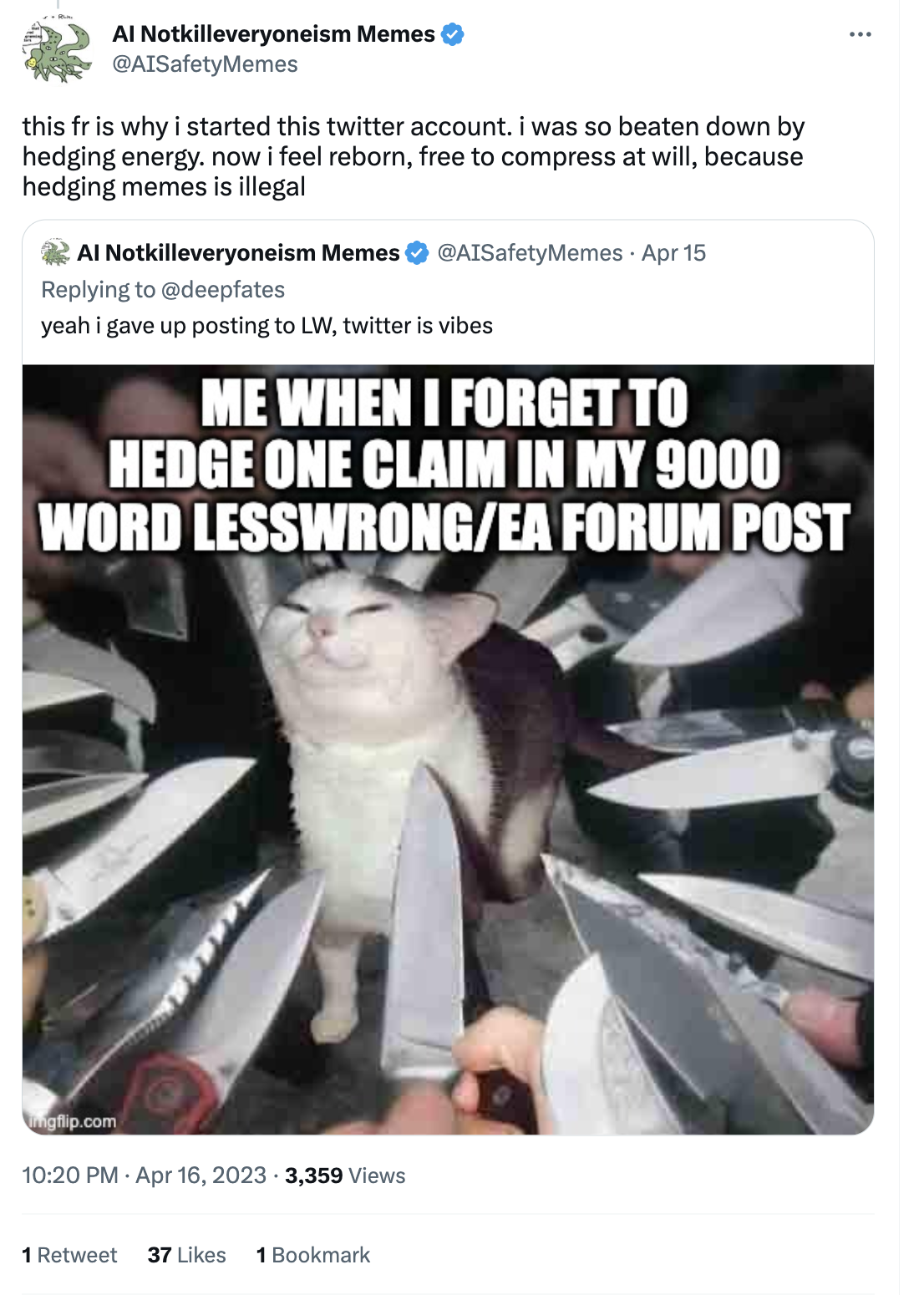We're losing creators due to our nitpicking culture
By TheAthenians @ 2023-04-17T17:24 (+167)
This is a cross-post from LessWrong, originally titled "Killing Socrates" by Duncan Sabien. Cross-posted with his permission.
This is posted from an anonymous account of somebody who has been on the Forum for over 7 years and has over 2500 karma who's more or less stopped posting on the EA Forum and LessWrong for exactly the reasons he describes.
This is not an isolated case. Here are a couple examples to illustrate this, and some memes that have been floating around EA Twitter that seem to be resonating. The first two examples are for LessWrong but just as easily could have been for the EA Forum, which has a similar culture.




Funnily enough, one of the top comments on the post at the time of publishing was somebody debating the correct pluralisation of "Socrates".
And remember that for every one famous case of somebody leaving because of it, there will probably be tens to >100 people who leave without saying anything.
This is an important problem, and I don't know the solution, but I hope it is discussed and addressed.
Or, On The Willful Destruction Of Gardens Of Collaborative Inquiry
One of the more interesting dynamics of the past eight-or-so years has been watching a bunch of the people who [taught me my values] and [served as my early role models] and [were presented to me as paragons of cultural virtue] going off the deep end.
Those people believed a bunch of stuff, and they injected a bunch of that stuff into me, in the early days of my life when I absorbed it uncritically, and as they've turned out to be wrong and misguided and confused in two or three dozen ways, I've found myself wondering what else they were wrong about.
One of the things that I absorbed via osmosis and never questioned (until recently) was the Hero Myth of Socrates, who boldly stood up against the tyrannical, dogmatic power structure and was unjustly murdered for it. I've spent most of my life knowing that Socrates obviously got a raw deal, just like I spent most of my life knowing that

It now seems quite plausible to me that Socrates was, in fact, correctly responded-to by the Athenians of his time, and that the mythologized version of his story I grew up with belongs in the same category as Washington's cherry tree or Pocahontas's enthusiastic embrace of the white settlers of Virginia.
The following borrows generously from, and is essentially an embellishment of, this comment by @Vaniver.
Imagine that you are an ancient Athenian, responsible for some important institution, and that you have a strong belief that the overall survival of your society is contingent on a reliable, common-knowledge buy-in of Athenian institutions generally, i.e. that your society cannot function unless its members believe that it does function.
This would not be a ridiculous belief! We have seen, in the modern era, how quickly things go south when faith in a bank (or in the financial system as a whole) evaporates. We know what happens when people stop believing that the police or the courts are on their side. Regimes (or entire nations) fall when their constituents stop propping up the myth of those regimes. Much of civilization is shared participation in self-fulfilling prophecies like "this little scrap of green paper holds value."
And if you buy
"My society's survival depends upon people's faith in its institutions."
...then it's only a small step from there to something like:
"My society's survival depends upon a status-allocation structure whereby [the people who pour their time and effort into building things larger than themselves] receive lots of credit and reward, and [the people who contribute little, and sit back idly criticizing] receive correspondingly less."
People follow incentives, after all. If you want them to contribute, you need them to believe that there is something worth contributing to, and that they will benefit from doing so. If you fail to incentivize the hard work of creation and maintenance, or if you equally incentivize the much easier work of armchair quarterbacking, you will predictably see more and more people abandoning the former for the latter.
From this perspective, Socrates looks much less like a hero whose sharp wit punctured the inflated egos of various Athenian Ayn Rand villains, and much more like someone who found a clever exploit in the system, siphoning status without making a corresponding contribution.
By adopting a set of tactics wherein one can win any fight by only attacking and never defending, one can place immense burdens on any positive action ("Oh, so this is annoying? How would you define annoying?") while not accepting any burdens of their own ("I'm just asking questions!"). One of Socrates's innovations was a sort of shamelessness—if someone responded to him with "only a fool doesn't understand what 'annoying' means!" he was happy to reply with "Indeed, I am a fool! So, can you explain it to me?"
This is not, in fact, a cooperative act. It is creating a burden—of explanation, of clarification, of interpretive and pedagogical labor—and then displacing that burden onto the other person. It's increasing the cost of contributing to intellectual progress, and thereby discouraging people from trying to contribute.
It is indeed important and valuable to have one or two Socrati around, just as it's important and valuable to have one or two court jesters who are willing to speak truth to power.
But Socrates—as affirmed by the majority vote of some 500 Athenians who convicted him—was corrupting the youth, i.e. setting an example which many of Athens' young people were emulating.
If it looks like a substantial fraction of an entire generation wants to grow up to be jesters instead of kings or knights or counsellors, then the bedrock upon which the polis rests—the collective self-fulfilling prophecy—crumbles. A thousand hole-pokers will rapidly tear the social fabric to shreds. This is an existential threat, to which the Athenians (plausibly) responded proportionately!
It's worth noting at least three other relevant things:
- The preceding decade had contained a military defeat, a puppet government installed by the conquerors, a coup, a counter-coup, and a counter-counter coup; things in Athens were actually unstable, and it's not difficult to be sympathetic to the view that this was the wrong time to be picking nits.
- During the trial itself, Socrates remained committed to the bit, wielding the same weaponized disingenuousness that brought him there in the first place.
- While the legend I absorbed in childhood holds that he was "murdered for telling the truth," most accounts show that he was allowed to propose his own punishment, and suggested that the state "punish" him by providing him with free food and housing as payment for noble service rendered. When the state replied with "how about death, instead?" Socrates basically responded "if you kill me, all those youth I've corrupted are gonna keep on doing exactly the same thing I taught them to do," which, again, sounds very hero-spitting-in-the-villain's-eye if you've predecided that you know who the good guys are, and less so if you have not.
More directly quoting the comment from which the above descends:
A few years ago, it seemed to me like one of the big problems with LessWrong was that the generativity and selectivity were unbalanced. There wasn't much new material posted on LW, and various commenters said "well, the thing we should do is be even harsher to authors, so that they produce better stuff!", and when I went around asking the authors what it would take for them to write more on LW, they said "well, putting up with harsh comments is a huge drawback to posting on LW, so I don't."
Now, it would have been one thing if it were the top writers criticizing things—if, say, Eliezer or Scott or whoever had said "actually, I don't really want my posts to be seen next to low-quality posts by <authors>" or had been skewering the flaws in those posts/comments. [Indeed, many great Sequences posts begin by quoting a reaction in the comments to a previous post and then dissecting why the reaction is wrong.] But instead, the commenter most frequently complained about by the former authors was a person who did not themselves write posts. [emphasis added]
Now, the specific person I had been thinking of had been around for a long time. In fact, when they first started posting, their comments reminded me of my comments from a few years earlier, and so I marked them as someone to watch. But whereas I acculturated to LW (and I remember uprooting a few deep habits to do so!), I didn't see it happen with them, and then realized that when I had been around, there had been lots of old LWers to acculturate to, whereas now the 'typical comment' was this sort of criticism, instead of the old LW spirit.
"Oh," I said in a flash of insight. "This is why they executed Socrates."
If a culture has zero Socrati, then you end up with an emperor strutting naked through the streets, claiming to be wearing robes of the most diaphanous silk.
One Socrates can prevent that. One Socrates can, in fact, call it like it is, and poke holes in things that aren't sound and defensible, and generally improve the health of the system via a kind of hormetic stress.
But if Socrates sets the vibe—if the youth of Athens decide that the right mode to be in is aggressively critical—if they view this as a noble calling, part of holding everyone else to account—if the percentage of people doing the Socrates thing rises above a pretty small threshold—
There's only so much withering critique a given builder is interested in receiving (frequently from those who do not themselves even build!) before eventually they will either stop building entirely, or leave to go somewhere where buildery is appreciated, rewarded, and (importantly) defended.
(Someplace where the Socrati do not have concentration of force.)
It's a dynamic tightly analogous to the Copenhagen Interpretation of Ethics, in which trying at all to help with a problem exposes you to blame and criticism, whereas turning a blind eye leaves you safely among the anonymous and un-attacked masses.
If trying to share any thoughts at all results in a metric ton of critique, criticism, nitpicking, sealioning, and unpredictable demands for rigor—
(Which, if left unanswered, tend to be treated by the Socratic crowd as moderately strong evidence that you were full of shit to begin with, ignoring alternative hypotheses like "maybe that question wasn't worth the time and effort it would take to deconfuse the asker.")
—then you will observe what we do, in fact, observe: multiple specific brilliant and talented writers who seem to be "just the type we want on LessWrong" who are oddly unwilling to come anywhere near the site.
(Some of them unwilling to come anywhere near the site anymore, despite the fact that they used to enjoy being here, back when the comment sections were primarily builders offering critique to each other, in an atmosphere of collaboration rather than one of evaluation and judgment.)
Vaniver continues:
There's a claim I saw and wished I had saved the citation of, where a university professor teaching an ethics class or w/e gets their students to design policies that achieve ends, and finds that the students (especially more 'woke' ones) have very sharp critical instincts, can see all of the ways in which policies are unfair or problematic or so on, and then are very reluctant to design policies themselves, and are missing the skills to do anything that they can't poke holes in (or, indeed, missing the acceptance that sometimes tradeoffs require accepting that the plan will have problems). In creative fields, this is sometimes called the Taste Gap, where doing well is hard in part because you can recognize good work before you can do it, and so the experience of making art is the experience of repeatedly producing disappointing work.
In order to get the anagogic ascent, you need both the criticism of Socrates and the courage to keep on producing disappointing work (and thus a system that rewards those in balanced ways).
Or, to put it another way:
There are a lot of LessWrong commenters who respond to perceived falsehoods with what looks a lot like an elevated sense of threat. "Don't let that one through! That one's wrong!"
But many of the actual claims being responded to in this fashion are not powerful snippets of propaganda, or nascent hypnotic suggestions, or psychological Trojan horses. They aren't the workings of an antagonist. They're just half-baked ideas, and you can either respond to a half-baked idea by helping to bake it properly...
...or you can shriek "food poisoning!" and throw it in the trash and shout out to everyone else that they need to watch out, someone's trying to poison everybody.
(Or pointedly interrogate the author on why exactly they chose to bake their idea this way when it's so clearly inadequate, would you please explain what made you think that this dough was sufficiently risen to be worth serving?
It's the difference between, say, writing a 3300-word piece about how one section of someone else's building is WRONG, and spending 3300 words suggesting a replacement that might solve the perceived problem better, without containing Flaw X or causing Negative Side Effect Y.
The end result of Socrates Unchecked is not, in fact, a bastion of pure reason and untainted truth. That's a fabricated option, like believing that a ban on price gouging during a disaster will result in the normal amount of gasoline being available at the normal prices.
What happens instead, in practice, is evaporative cooling, as the most sensitive or least-bought-in of [the authors/builders who made your subculture worth participating in in the first place] give up and go elsewhere, marginally increasing the ratio of critics to makers, which makes things marginally less rewarding, which sends the next bunch of builders packing, which worsens the problem further. A steady influx of, say, people worried about AI can slow this process, but not stop or reverse it (especially if the newcomers pick up on the extant vibe and conclude that That's How We Do Things Around Here).
People like to repeat the phrase "well-kept gardens die by pacifism," but they also flinch from killing Socrates, when Socrates is busy suffocating every seedling he can find, and draining the joy out of the act of gardening.
I claim this is an error.
Nathan Young @ 2023-04-18T14:25 (+38)
I've thought about this quite a lot
In particular, after watching Lizka's forum talk and talking with Aaron Gertler:
- Are my comments providing energy to the discussion or removing energy from it
- Are my attempts to find truth actually unearthing truth or causing exhaustion?
- Criticism vs. it will never be enough
- Some personal errors/complexites
How do I encourage more energy into the discussion not sap it
I have some ADHD tendencies - I have a short attention span and little trust that I will do tasks I start. If I don't comment now, I probably won't. I think this led to lots of very low effort comments. I think is fine (good?) on twitter but I'm less sure about it on the forum. Since then I've tried to write things that create more potential for discussion.
Truth vs Exhaustion
I don't want to get into the object level here, but around the Owen Cotton-Barrett stuff I wrote a load of little poll comments to try and allow people a way to express their views without having to put their own heads above the parapet. Some people liked these, others did not.
Those that liked them appreciated a much cheaper way to express their veiws.
Those that didn't like them felt the polls were unrepresentative and so gave a false picture.
This is a hard problem. I was really trying to improve the discourse. Maybe I failed. I'd like to note how hard it is. How there isn't necessarily an easy answer here.
How can we be enough?
My therapist says I take too much responsibility for things and that I shouldn't aim for limitless self improvement. I am less certain - I do reasonable amounts of harm accidentally, to partners, friends and colleagues. I want to get better.
I'm an ex-Christian, and in Evangelicalism, there is the notion of "the now and not yet", how things are in tension between how they are and what they could be. I am valuable, but I want to be better.
Likewise the forum straddles this line, where we both want to be open to criticism without tearing our most conscientious members down. I don't know the answer here either. I was reading the post about Redwood Research the other day and while I think criticism is good I mused on how it must feel to read. I sense the folks at Redwood work really hard, and my general sense is that external criticisms are ill-founded (though still provide information on net), so probably it's pretty frustrating to feel like your community doesn't value your work.
I don't think that's true by the way, but I think it's how it can feel. Like we are all just waiting for one another to step out of line and then publish a useful but searing critique.
I have heard this from a number of core EAs - that they hate posting on the forum. That they are scared of what we'll say in the comments. This doesn't make me feel good.
How do we do criticism in a way that shows we are really grateful for the work of those involved?
Reflections on my own actions
There are a few things that I play over in my head in regard to this forum/community being too self critical.
- The scandal markets. I have a half written retrospective somewhere, but suffice it to say that after FTX crisis I decided that I knew the best way to deal with monitoring personal morality and it was to create a load of fake money prediction markets on whether key figures in the movement would be convicted of fraud. I deleted them pretty quickly. I think finding out that people are betting on if you do crime is probably a central case of the kind of tearing down that I think exhausts us. I guess it left some people feeling like we really did not have their back. While there is more to say, I'm sorry I just didn't wait a while and find consensus. I have written about loyalty, and I still don't know what we owe our leaders. But I really hope there is a way that doesn't leave people feeling like this (though sadly I don't think we can just trust our leaders to be good)
- The poll posts. I really strongly think it matters what we all think about things and that representative polls are great. I think the forum comments can be pretty oppressive around a scandal and people can be scared to talk. And I'm open to the idea the poll posts were good on net, but again it just feels like they caused more harm than they needed to. I feel pretty sad about that
- Some comments. I once commented on Will's accent in a post. I wasn't really thinking and it seemed like an interesting point, but I think it was an error. Sorry Will. I think that I forgot he's a person, not a number on a spreadsheet to be optimised. And I guess he didn't ask for my opinion on his accent. I think the line here is blurry, but there is a kind of comment that moves from discussion of an org, to discussion of an individual, and without a relationship behind it, those can feel pretty brutal. Again, I think that sometimes these things are warranted, but I think we are probably too free with them and it makes the forum a worse place to exist.
Endnote
I am really grateful to be part of this community. Genuinely. I am so moved by the work that people do to try and make the world better. I'm moved by those who are giving a bit and trying to do it effectively and I'm moved by my friend who will not have taken a singly day of holiday until some time in the middle of the year, because they think that's the right thing to do. And I don't think we can just "be kinder" - because kindness sometimes trades off against truth. But it's a thing I really want. I really want to figure out the way we can both correct our flaws, challenge one another and feel protected and safe.
I am a big believer that problems are solvable but that don't something isn't necessarily better than doing nothing. I don't know what the solution is here, but I think we have a problem.
Geoffrey Miller @ 2023-04-17T19:23 (+34)
A fascinating and provocative post; I hope lots of EAs read it. It nicely captures some of the frustration I've experienced in my limited engagement with LessWrong.
If I had to choose between Socrates and Aristotle, I'd choose Aristotle as a better philosophical role model. Socrates basically promoted the idea that you can get closer to the truth through armchair debate, spotting logical fallacies, defining terms, testing edge cases, mocking inconsistencies, etc. Aristotle promoted a more grounded, based, adventurous empiricism, that involves actual travel, observation of nature, and gathering new information.
Insofar as LessWrong has been leaning a little too far in the Socrates direction, it's probably become a less empirically fruitful platform, and a more emotionally frustrating one.
Duncan Sabien @ 2023-04-17T19:38 (+20)
Another way to think about this (imo) is "do you screen falsehoods immediately, such that none ever enter, or do you prune them later at leisure?"
Sometimes, assembling false things (such as rough approximations or heuristics!) can give you insight as to the general shape of a new Actually True thing, but discovering the new Actually True thing using only absolutely pure definite grounded vetted airtight parts would be way harder and wouldn't happen in expectation.
And if you're trying to (e.g.) go "okay, men are stronger than women, and adults are smarter than kids" and somebody interrupts to go "aCtUaLlY this is false" because they have a genuinely correct point about, e.g., the variance present in bell curves, and there being some specific women who are stronger than many men and some specific children who are smarter than many adults ... this whole thing just derails the central train of thought that was trying to go somewhere.
(And if the "aCtUaLlY" happens so reliably that you can viscerally feel it coming, as you start to type out your rough premises, you get demoralized before you even begin, close your draft, and go do something else instead.)
Ubuntu @ 2023-04-23T14:26 (+15)
I'd love to see the option to disable comments on your posts.
If people have really important feedback on the post, they can share it via DM (which I feel is the default in professional spaces and small communities, but regrettably maybe isn't here, it's hard to tell). Or if they feel the need to discuss it publicly, they can make their own shortform/post. But this option would allow the bar for public criticism to sometimes be raised when posters feel they can't face the negativity.
I feel like a lot of people on this forum get angry and suspicious at proposals to reduce incentives to publicly criticise each other, but I really think they underestimate the toll it often takes on the criticised. And in some cases they know but they forget - I've seen EAs who've commented in the past about how scared they are to post on here enthusiastically join in with some of the recent pile-ons.
I also think comments sections lose us a lot of visitors as well as creators - comments generally feel like more 'nitpicky' places than posts (i.e. the ratio of expressions of annoyance to useful information feels higher in comments sections).
trevor1 @ 2023-04-17T19:57 (+8)

It seems like august!aella was really on the ball here; commenters just shouldn't make people feel bad so they just can't bring themselves to post there again. That's pretty simple and to-the-point.
Where was this originally posted?
But many of the actual claims being responded to in this fashion are not powerful snippets of propaganda, or nascent hypnotic suggestions, or psychological Trojan horses. They aren't the workings of an antagonist. They're just half-baked ideas, and you can either respond to a half-baked idea by helping to bake it properly...
...or you can shriek "food poisoning!" and throw it in the trash and shout out to everyone else that they need to watch out, someone's trying to poison everybody.
The problem is that there are antagonists out there, especially on twitter, and those antagonists do make full-baked snippets of propaganda, clever suggestions, and psychological trojan horses. You'll find examples everywhere you look. Twitter might feel friendly and safe, but it's actually just really good at posing like that (Goodharting); the idea that twitter is actually as friendly and safe as it feels (especially compared to EAforum and Lesswrong) is liable to cause a lot of harm, and thus is worth pointing out as harmful and wrong.
There is basically no chance of improving twitter, whereas the entire premise of this post is that EAforum and Lesswrong ought to improve, because they clearly can (and have a record of doing so).
Matt Goodman @ 2023-04-18T10:44 (+5)
I was surprised to see Twitter noted as a good place to share thoughts, I think mainly because it's rare I hear anyone say a good word about Twitter. I don't use it, as my impressions of twitter are:
- seems like a lot of toxic arguments, ad hominen attacks, straw man arguments etc etc unless you heavily filter to only be communicating with people who already agree with pretty much everything you say
- the word limit is too short to be able to explain anything with nuance, which promotes more straw man arguments because commenters take the worst possible interpretation of what's been said and then argue against that, which then causes the OP to be upset that they've been misinterpreted, so they react badly and so on and so on.
Then again, I know some people I generally respect use it. Am I missing anything here?
Nathan_Barnard @ 2023-04-20T16:03 (+3)
EA twitter is great.
Matt Goodman @ 2023-04-18T11:32 (+7)
This resonated with me. I get some internal strife and anxiety about posting on here. I think it's a combo of caring a lot about the kind of things being discussed here (suffering, global poverty, animal welfare, xrisk), and having thoughts about these things, and wanting to share them, but then finding the negative incentive of [being criticised in the comments] outweighs the positive incentives of [temporary status amongst strangers on the internet], plus some sort of [happiness at being able to express myself].
It seems for me the emotional drive to post has to outweigh the emotional drive to not post, and this sometimes only happens on very emotionally charged subjects, such as criticism of EA or the various recent scandals. I don't think I'm alone in this, and I would cite for evidence the comment count on articles about scandals in the community, vs on other articles.
I don't think the EA forum is unique in having this kind of not-great incentive structure. Some ways the EA forum might be worse than most internet forums:
- The featured posts here are really high quality. Of course, that's a good thing. But if all the frontpage posts are by someone with a phd, and the the post is a write up of their research, and they've been paid by an EA organisation so they can do that research full time and put many hours into making a quality post... it can be easy to compare what you were going to write against that, and be disappointed.
- There's a strong culture of searching for truth and encouraging good epistemic. Again, this is a very good thing, and I wouldn't change this. But it can seem that unless your post is long and detailed, and has citations you'll get criticised for it.
And some ways the EA forum is better:
- People go out of their way to say thanks for the article, or praise the writing. This seems to happen a lot when someone is actually criticising; there's almost a norm of including a clunky 'thanks for writing this, I like some things but....' which I actually quite like.
- There are stronger norms of not being needlessly rude. The mod team seem to be more on it than e.g. a reddit forum. I'm guessing the ratio of mods/posters here is higher than on reddit, plus the mods here get paid to do it.
- There's a monthly cash prize competition for forum posts
- The EA forum team seem to actively promote posting not-perfect stuff, there's the Shortform option, the option to share a draft with other users, the Draft Amnesty day, and workshops at EAG events on writing EA forum posts
I slightly worry the EA forum could become a place where only people who have a paid job at an EA org, or who enjoy disagreement, post. Nothing against enjoying disagreement, and it could be something to cultivate as part of developing a 'Scout Mindset', but I think there's people that are more sensitive to disagreement that might be put off posting.
More food for thought: the 1% rule; I'm not sure what conclusions to draw from it.
edit: added penultimate paragraph.
Nathan Young @ 2023-04-20T14:41 (+4)
Suggestion: Posts have an agree/disagree as well as an upvote downvote. That way if everyone agrees then it wouldn't feel so bad if there are nits. And if noone agrees then a harsh but upvoted post wouldn't feel so painful.
Corentin Biteau @ 2023-04-18T14:02 (+3)
Thanks for writing this, it's true that the expectation of "I must post high-level content" can seriously hinder our willingness to post stuff. Even though writing simple things does add something.
I suppose a simple thing that we can do about this, as a commenter, is saying thanks to posts we liked, even if we don't have anything to add. So thanks again !
Yarrow Bouchard @ 2023-11-06T09:32 (+1)
I get that Socrates was annoying, but the death penalty seems harsh. Maybe, like, force him to wear a silly hat.
